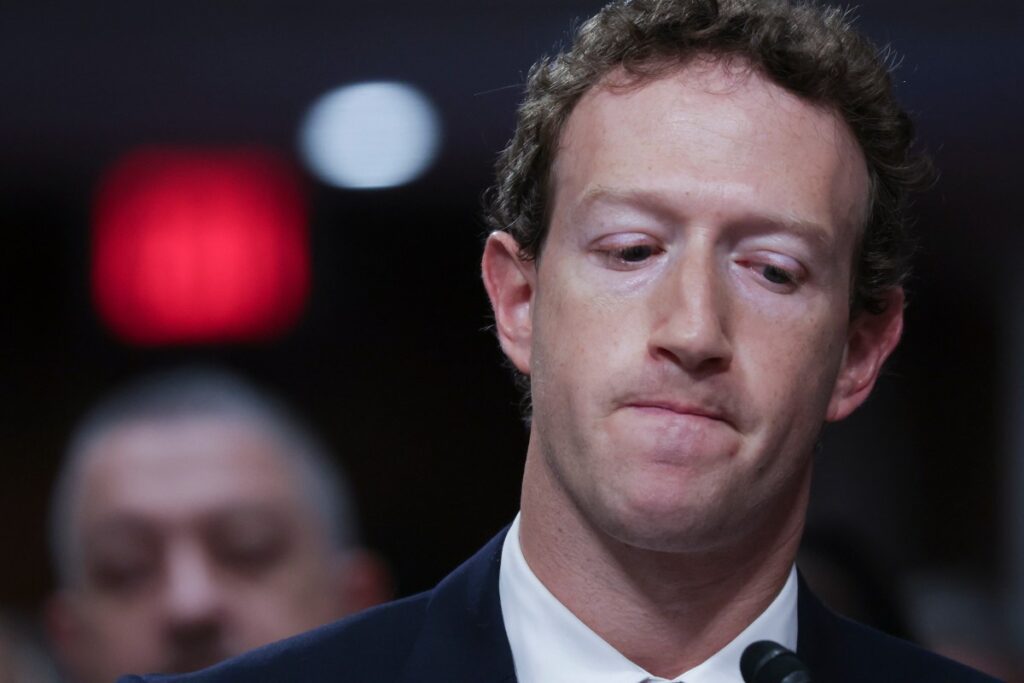
Social Media Platform Strategy: Zuckerberg Once Considered Instagram Spin-Off to Save Facebook
Social Media Platform Strategy: Zuckerberg Once Considered Instagram Spin-Off to Save Facebook
Meta CEO Mark Zuckerberg’s internal emails reveal complex social media platform strategy decisions regarding Instagram’s relationship with Facebook. Image: NewsToday360
Newly revealed internal communications from Meta CEO Mark Zuckerberg expose a fascinating glimpse into the company’s social media platform strategy challenges. In emails surfaced during the ongoing FTC antitrust trial against Meta, Zuckerberg expressed serious concerns that Instagram was “cannibalizing” Facebook engagement, potentially leading to a “network collapse of the more engaging and profitable product.” Most surprisingly, these documents reveal that Zuckerberg once considered spinning out Instagram as a separate business—ironically, the very outcome the FTC now seeks to enforce through its lawsuit.
Table of Contents
The Cannibalization Concerns
At the heart of Meta’s social media platform strategy challenge was a surprising internal conflict: the company’s acquisition of Instagram—widely celebrated as one of the most successful tech acquisitions in history—appeared to be undermining Facebook’s own engagement metrics. In a May 2018 email to top executives including Sheryl Sandberg, Chris Cox, and others, Zuckerberg outlined his concerns that the company’s approach to its “family of apps” might be fundamentally flawed.
We currently expect both Facebook and Instagram to be able to grow, but it seems likely to be the case that if we promote Instagram to be around the same size as Facebook, that will have significant negative effects on Facebook that we are not currently modeling.
This revelation provides unprecedented insight into the complexities of managing multiple competing social platforms under one corporate umbrella. The social media platform strategy dilemma Zuckerberg faced highlights a fundamental tension: success for Instagram potentially meant decline for Facebook, the company’s flagship platform and primary revenue generator at the time.
Key Social Media Platform Strategy Concerns
- User migration from Facebook to Instagram was reducing Facebook engagement
- Internal data showed Facebook usage “declines significantly” when users join Instagram
- The effect appeared to compound as Instagram’s user base grew
- Instagram’s growth was largely driven by Facebook’s own distribution and friend graph
- Instagram was potentially less profitable despite higher engagement
Instagram’s Impact on Facebook’s Growth
The emails reveal that Meta’s social media platform strategy team had detected a troubling pattern in user behavior. According to Zuckerberg, internal data showed that when users joined Instagram, their Facebook engagement “declines significantly.” Even more concerning was his observation that “this hollowing out of Facebook usage compounds as a larger percent of the population gets on Instagram.”

Meta’s internal data suggested Instagram’s growth was directly impacting Facebook engagement, creating a significant social media platform strategy challenge. Image: NewsToday360
Zuckerberg’s message highlighted a fundamental miscalculation in Meta’s social media platform strategy: “This raises the issue that our models for the future may be wrong.” He specifically noted that while the company expected both platforms to grow simultaneously, promoting Instagram to reach Facebook’s scale would likely have “significant negative effects on Facebook that we are not currently modeling.”
The Network Collapse Scenario
Zuckerberg’s most alarming assessment described a potential “network collapse” scenario. He noted that while “the Facebook network can likely sustain decreased engagement among some of its members,” if engagement across Facebook’s entire user base was “hollowed out,” it could lead to “significantly worse outcomes than we currently expect.” This analysis reveals the delicate balance companies must maintain in their social media platform strategy when managing multiple competing products.
Particularly notable was Zuckerberg’s acknowledgment that Instagram’s growth largely depended on distribution from the Facebook app and leveraging Facebook’s friend graph—essentially admitting that Facebook was contributing to its own potential decline through its promotion of Instagram.
Integration vs. Separation: Strategic Dilemma
Facing this cannibalization challenge, Zuckerberg outlined two opposing social media platform strategy options: deeper integration of Meta’s apps or spinning out Instagram as a separate business. Initially, he proposed reducing Facebook’s promotions of Instagram while simultaneously building “bridges” between the platforms to make them “increasingly function as a single network in more respects.”
Zuckerberg suggested several integration initiatives as part of Meta’s social media platform strategy:
- Making it easier for video creators to engage audiences across both platforms
- Combining voice and video calling networks across WhatsApp, Messenger, and Instagram
- Creating more cross-platform features to enhance the “family of apps” ecosystem
Surprisingly, Zuckerberg also floated the alternative social media platform strategy of spinning out Instagram:
- Could preserve Facebook’s growth trajectory
- Might help retain Instagram’s founders Kevin Systrom and Mike Krieger
- Would allow both platforms to develop independent growth strategies
- Described as possibly “the only structure” to accomplish certain goals
This strategic fork in the road exemplifies the complex decisions tech companies face when managing multiple popular platforms. Meta ultimately pursued deeper integration as its primary social media platform strategy, introducing cross-platform messaging between Instagram and Facebook in 2020 (though this feature was later discontinued in 2023).
The Integration Path Chosen
Despite considering a separation strategy, Meta ultimately doubled down on integration, making a series of social media platform strategy decisions that further entrenched Instagram within the Meta ecosystem. This included attempts to create a more unified experience across platforms, with features like cross-app messaging, shared stories, and eventually, integrated business tools for advertisers spanning all Meta platforms.
Branding Strategy Considerations
Another fascinating aspect of Meta’s social media platform strategy revealed in Zuckerberg’s emails was his concern about brand perception. He pushed for a rebranding approach that would keep Facebook’s identity prominently displayed across all the company’s applications.
When you open those apps, it would say ‘Instagram by Facebook’ and ‘WhatsApp by Facebook’… We may even need to put Facebook branding in the chrome of those apps where the app names and logos are today to cement this relationship in people’s minds.
This branding proposal highlights Zuckerberg’s concern that Instagram’s rising cultural relevance was contributing to Facebook’s declining position in popular culture. The social media platform strategy he proposed sought to leverage Instagram’s popularity to bolster Facebook’s brand rather than allowing Instagram to eclipse its parent platform.
The Eventual Rebrand
Ironically, Meta’s ultimate social media platform strategy went in the opposite direction. Instead of emphasizing the Facebook brand across all products as Zuckerberg suggested in 2018, the company rebranded as Meta in 2021, reducing Facebook to just one platform within a larger corporate structure. This reversal demonstrates how quickly strategic priorities can evolve in the dynamic social media landscape.
Founder Retention Challenges
A critical dimension of Meta’s social media platform strategy concerned the retention of acquired companies’ founding teams. Zuckerberg specifically mentioned challenges in building new products within Instagram and WhatsApp because of “their founder leadership,” suggesting tensions in the company’s management structure.
Particularly revealing was Zuckerberg’s admission that management couldn’t openly discuss concerns about Instagram’s impact on Facebook, as it might “demoralize the team and prevent the company from retaining Instagram co-founders Kevin Systrom and Mike Krieger.” This internal conflict highlights the human element of social media platform strategy decisions, where corporate politics and personnel considerations often influence technical and business strategy.
The Founder Exodus
Despite Zuckerberg’s concerns about retention, Instagram’s founders left the company in September 2018, just months after his email. This departure represents a significant failure in Meta’s social media platform strategy, as maintaining founder leadership was explicitly identified as a key priority. The timing suggests that the tensions Zuckerberg referenced may have already been approaching a breaking point when he wrote the email.
The founder retention issues extended beyond Instagram. WhatsApp founders Brian Acton and Jan Koum also departed Meta, reportedly over disagreements about privacy and monetization strategies. These high-profile exits underscore the challenges of maintaining innovative leadership within acquired companies—a persistent difficulty in tech acquisition social media platform strategy.
FTC Case Implications
The revelation of these internal discussions has significant implications for the ongoing FTC antitrust case against Meta. The agency’s lawsuit alleges that Meta operates a social networking monopoly, maintained in part through its acquisitions of potential competitors like Instagram and WhatsApp. These emails could strengthen the FTC’s position by demonstrating that Zuckerberg recognized Instagram as a competitive threat to Facebook, even after acquisition.
Potential Outcomes of the FTC Case
| Outcome | Impact on Meta’s Social Media Platform Strategy |
|---|---|
| FTC Victory (Forced Divestiture) | Meta would need to spin out Instagram and WhatsApp as separate companies, fundamentally reshaping its ecosystem approach |
| Partial Remedy | Potential restrictions on data sharing or cross-promotion between platforms, limiting integration capabilities |
| Meta Victory | Continued ability to maintain integrated “family of apps” approach to social media platform strategy |
Remarkably, Zuckerberg himself had predicted this potential outcome in his 2018 email, warning that there was a “non-trivial chance” that Meta could be forced to spin out Instagram and WhatsApp within 5 to 10 years, making their integration work “something we don’t get to keep.” This prescient observation demonstrates Zuckerberg’s awareness of the antitrust risks inherent in Meta’s social media platform strategy.
Out-of-context and years-old documents about acquisitions that were reviewed by the FTC more than a decade ago will not obscure the realities of the competition we face or overcome the FTC’s weak case.
Meta has attempted to downplay the significance of these emails, arguing they represent out-of-context and outdated thinking that doesn’t reflect current competitive realities. However, the documents provide a rare window into the highest-level social media platform strategy debates within one of the world’s most influential technology companies.
The Future of Meta’s Platform Strategy
The ongoing FTC case places Meta at a crossroads in its social media platform strategy. If forced to divest Instagram and WhatsApp, the company would face a fundamental restructuring of its business model and competitive position. Ironically, this outcome was once considered voluntarily by Zuckerberg himself as a potential solution to the platform cannibalization problem.
Regardless of the trial’s outcome, these revelations provide valuable insights into the strategic challenges of managing multiple competing social platforms under one corporate umbrella. As the social media landscape continues to evolve, Meta’s social media platform strategy decisions—whether forced by regulators or chosen by executives—will shape the future of digital social interaction for billions of users worldwide.





